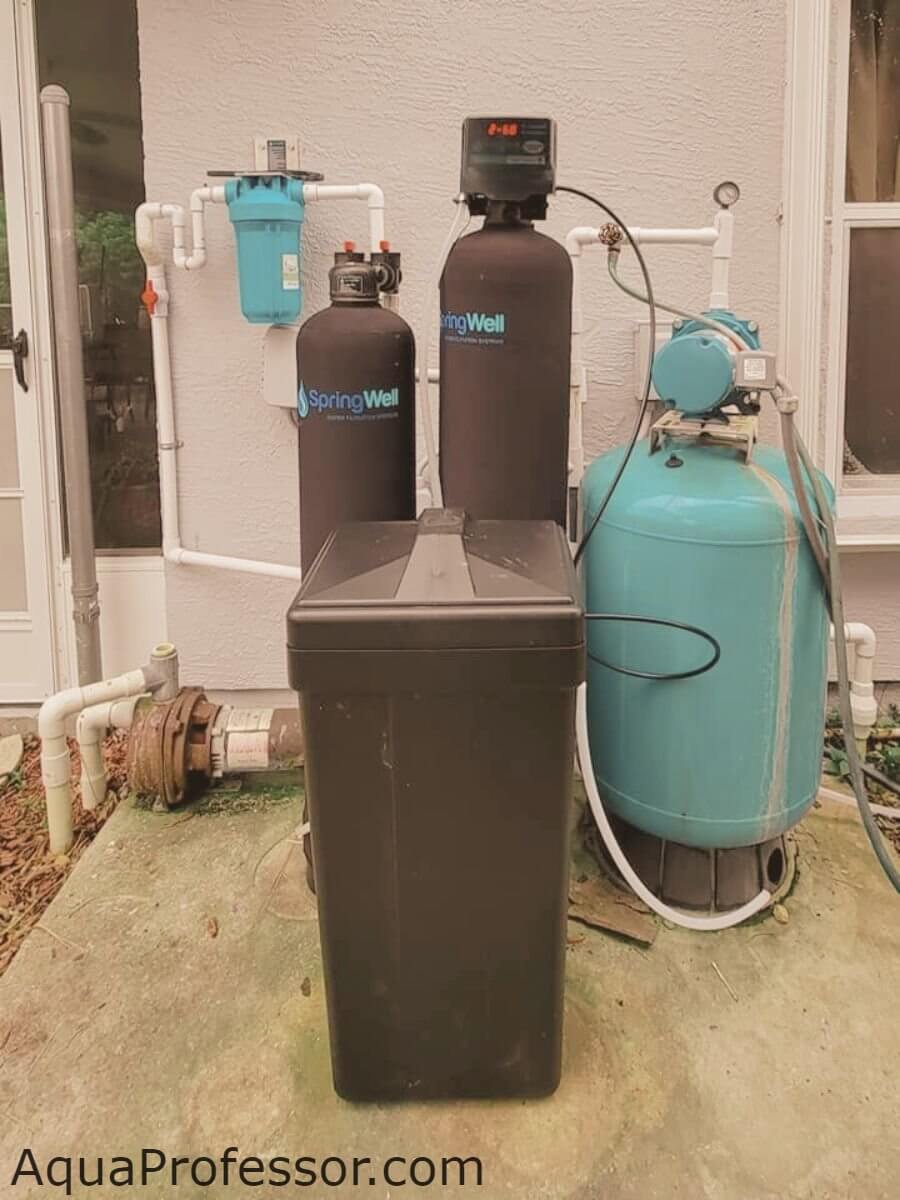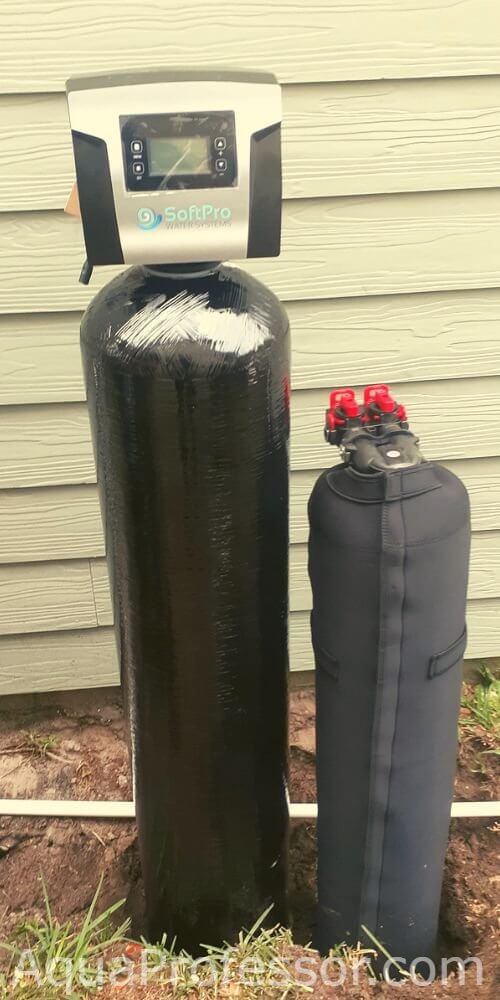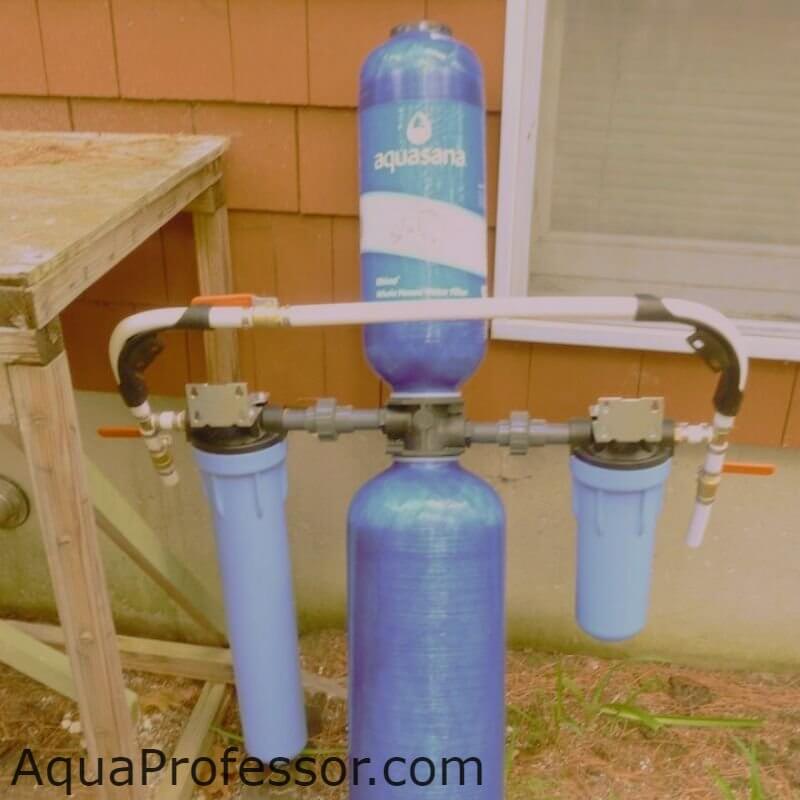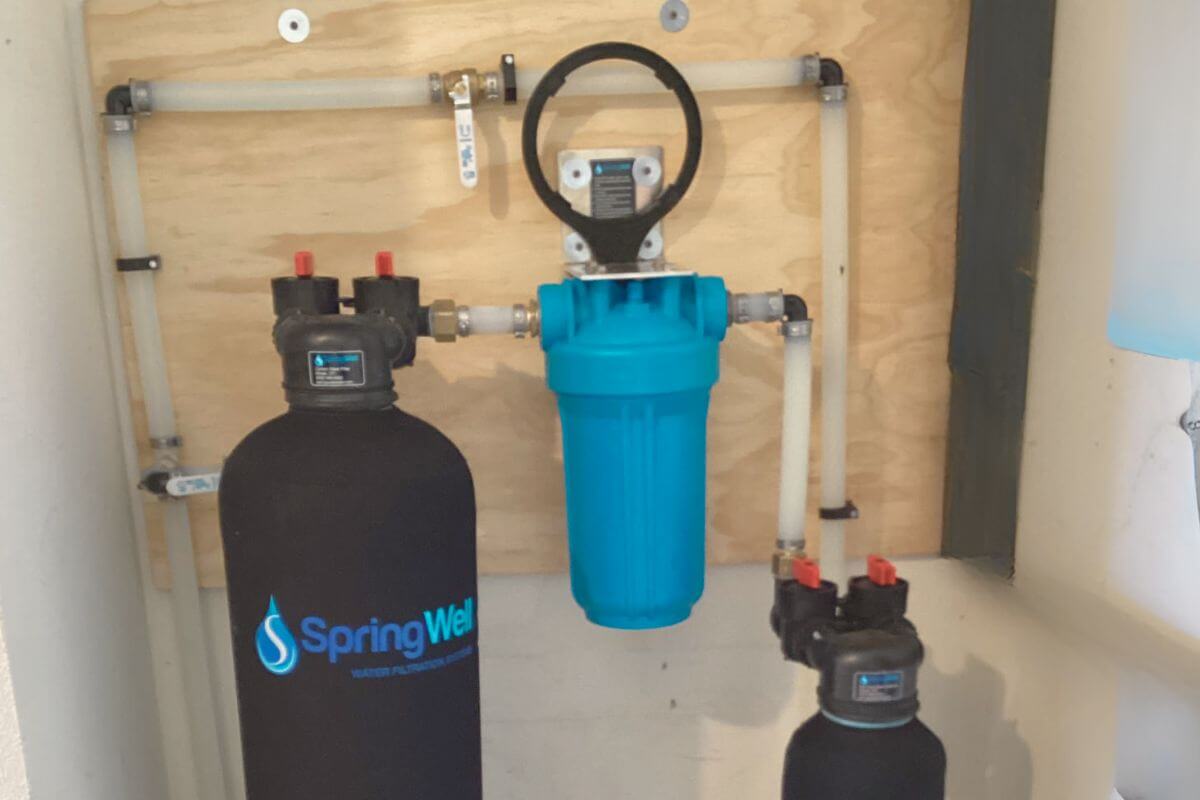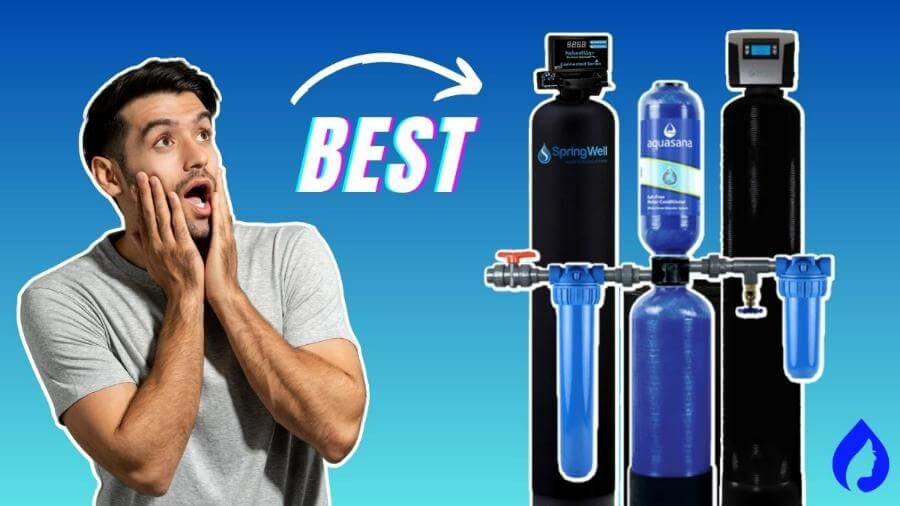
The permanent solution to all hard water problems is water softeners, but there are legit complications to using softeners with septic systems.
Simply put, a septic tank system requires a demand-initiation regeneration softener that minimizes salinity to ensure smooth operation.
To make your search easier, we’ve shortlisted 3 best water softener for septic systems after weeks of research. Let’s dive in!
🏆Top 3 Septic Safe Water Softener In 2024: A Smart Preview!
SpringWell SS
- Demand-initiated REGEN
- Excellent Softening Efficiency
- Supports 7+ bathroom units
- Upto 20 GPM Flow Rate
- Limited lifetime warranty
SoftPro Elite
- Demand-initiated REGEN
- Excellent Softening Efficiency
- Supports upto 5 family members
- Upto 15 GPM Flow Rate
- Limited lifetime warranty on system + Restricted warranty on worn parts
Aquasana Salt-Free Water Conditioner
- No Regeneration needed
- Conditions water to remove scales
- Supports upto 5 family members
- Upto 15.3 GPM flow rate
- 10-year limited warranty
Here's How We Test Products At Aquaprofessor
- 🏆Top 3 Septic Safe Water Softener In 2024: A Smart Preview!
- 💧Best Water Softeners For Septic Systems: Detailed Reviews!
- 👉How Do I Know Which Water Softener for Septic Systems to Buy?
- 🎯How Does A Salt Water Softener Affect A Septic System?
- ✅How To Safely Use Water Softener With Septic System?
- 💡Water Softeners And Aerobic Septic Systems: FAQs
💧Best Water Softeners For Septic Systems: Detailed Reviews!
| Softener | Regeneration Method | Flow Rate | Warranty |
| SpringWell SS | Demand-initiated | Upto 20 GPM | Limited lifetime warranty 6-month satisfaction guarantee |
| SoftPro Elite | Demand-initiated | Upto 15 GPM | Limited lifetime warranty on system + Restricted 7-year warranty on wear parts |
| Aquasana Salt-Free Water Conditioner | No regeneration needed | Upto 15.3 GPM | 10-year limited warranty + 90-day satisfaction guarantee |
🥇Best Overall: SpringWell SS
Pros
- Excellent softening efficiency.
- Demand-initiated regeneration.
- Potassium salt compatibility.
- Upto 20 GPM flow rate
- Limited lifetime warranty and 6-month satisfaction guarantee
- Suitable for 7+ bathroom units
- Build with certified components
Cons
- Regular maintenance is necessary for proper functioning.
- Expensive to purchase, install, and maintain.
SpringWell is a reputable company known for its high-quality water treatment systems, including water softeners, filters, and whole-house systems. With a focus on innovation and performance, SpringWell has established itself as a trusted brand in the industry.
🤔Why #1 Pick?
- Demand-Initiated Regeneration: This feature ensures that the softener regenerates only when necessary, minimizing excessive discharge into the septic tank system.
- Compatibility with Potassium Salt: The SpringWell SS allows using potassium salt, which reduces salinity and helps maintain a balanced environment within the septic tank.
- High-Performance Water Softener: It ensures the removal of calcium and magnesium minerals that contribute to hard water, reducing the strain on the septic system.
- Reliable Performance: The SpringWell SS has been positively reviewed by various users for its consistent and reliable performance.
👌How It’s Safe For Septic Systems?
The salty discharge from water softeners can damage your septic tank. So, it is recommended to use softeners that use salt efficiently, regenerate only on demand, or condition water minerals to make discharge safe for a septic tank system.
Good for you: SpringWell SS utilizes demand-initiated regeneration, ensuring that the water softener only regenerates when necessary.
It helps prevent excessive discharge and reduces the burden on the septic system. Additionally, using potassium salt instead of sodium salt further reduces the impact on the septic tank.
💦Softening Efficiency
The SpringWell SS system works on a water-softening process called ion exchange to effectively remove high concentrations of calcium, magnesium, and other minerals that cause hardness in water.
99% Softening Efficiency!
Its 99% softening efficiency prevents your home from the adverse effects of hard water, such as limescale buildup, stains, dry skin, and rough hair.
📱Ease Of Use And Maintenance
The SpringWell SS features a user-friendly interface that allows for easy operation and adjustment of settings. The system has a smart digital Bluetooth control valve that can automatically regulate the regeneration cycles.
The Bluetooth-controlled valve can be connected to a mobile application. You can monitor, control and change settings using this, saving thousands of gallons of water.
Additionally, the compact and space-saving design of the system makes installation and maintenance hassle-free.
🚿Water Flow Rate And Grain Capacity
The SpringWell SS is available in three different models: SS1, SS4, and SS+, with varying flow rates and grain capacities to accommodate different household needs.
👨💻Customer Support, Warranty, and Certifications
The company offers a limited lifetime warranty on tanks and valves and a 6-month satisfaction guarantee to ensure long-term protection for your investment.
You can contact their customer service via post, phone call, email, contact form, or chat facility on the website. It is manufactured using NSF-certified components.
🗝️Key Takeaway:
SpringWell SS is our top pick due to its demand-initiated regeneration feature and the option to use potassium salt, making it a safe and effective choice for your septic system.
🥈Also Good: SoftPro Elite
Pros
- Excellent softening efficiency
- Demand-initiated regeneration
- Water flow rate of upto 15 GPM
- Limited lifetime warranty on the system
- Restricted 7-year warranty on worn parts like circuit boards and pistons
- Independently tested against NSF/ANSI certifications
- Suitable for hardness up to 17 GPG
- No electricity is required
Cons
- Regular maintenance is required for optimal performance.
- Expensive to purchase and maintain.
- More space-consuming than other softeners
SoftPro is another well-established and reputable company in the water treatment system industry. Its SoftPro Elite has become one of the most efficient water-softening options today. Let’s find out why!
🤔Why #2 Pick?
👌How It’s Safe For Septic Systems?
The SoftPro Elite utilizes demand-initiated regeneration, ensuring the softener regenerates only on command to minimize excessive discharge into the septic system and reduce strain on the septic tank.
💦Softening Efficiency
With an impressive softening efficiency of up to 99%, the SoftPro Elite uses a high-capacity resin bed and advanced ion exchange technology to remove water hardness minerals effectively.
📱Ease Of Use And Maintenance
The SoftPro Elite has a digital control valve and a user-friendly 4-line LCD display with a touchpad that provides real-time information on system status and water usage.
Easy Filter Changes
It also offers low maintenance with its self-cleaning mineral tank and the option for a bypass valve for easy filter changes or maintenance tasks. It is engineered to use less salt, save water, and reduce operating costs.
🚿Water Flow Rate And Grain Capacity
The SoftPro Elite offers high flow rates of up to 15 GPM, ensuring a consistent supply of soft water even during peak usage. The system’s capacity ranges from 32,000 to 80,000 grains, accommodating different water hardness levels and household sizes.
👨💻Customer Support, Warranty, and Certifications
The SoftPro water softening capabilities are backed by an outstanding lifetime warranty on the tank, a limited lifetime warranty on the control valve, and a restricted 7-year warranty on wear parts.
In case of queries, you can contact their customer service team via phone, email, or contact form available on their website. The system has IAPMO R&T certification against NSF/ANSI.
🗝️Key Takeaway:
SoftPro Elite is an excellent choice for septic systems thanks to its demand-initiated regeneration capability, providing efficient water softening without compromising the septic system’s functionality.
🥉Salt-Free Alternative: Aquasana Water Conditioner
Pros
- Salt-free Eco-friendly option for septic tank
- Advanced NAC Technology
- Low maintenance
- Upto 15.3 GPM flow rate
- 10-year limited warranty
- 90-day money-back satisfaction guarantee
- Independently tested against NSF/ANSI standards
Cons
- Does not remove hardness from water.
- Additional filters are required in case of high water hardness.
- Costlier
- Installation requires professional help.
Aquasana, founded in 1997, aims to provide consumers access to clean and healthy drinking water. The company has since supplied reliable water filtration products catering to residential customers.
🤔Why #3 Pick?
👌How It’s Safe For Septic Systems?
The Aquasana Salt-Free Water Conditioner operates as a conditioner rather than a traditional water softener, which means it does not add salt to the water.
This feature makes it a suitable choice for septic units, as it reduces the risk of excessive salt discharge that can negatively impact the septic tank system.
💦Softening Efficiency
The Aquasana conditioner provides effective water conditioning without the use of salt. It has a conditioning capacity of 1,000,000 gallons or 10 years.
While it does not remove hard water minerals like calcium and magnesium from water, it uses a specialized Scale Control Media (SCM) and NAC technology to alter the structure of minerals, reducing their ability to form limescale deposits.
The salt-free approach helps protect your plumbing system and appliances while retaining essential minerals in the water, providing an eco-friendly and low-maintenance solution for tackling hard water issues.
📱Ease Of Use And Maintenance
The Aquasana Salt-Free Water Conditioner has a user-friendly dual-tank design and minimal maintenance. Installation is simple and can be done by homeowners with basic plumbing skills.
As for maintenance, the system requires no salt refills or complex programming. Its compact size and robust housing make installation and cleaning easy. It comes with a 20-inch pre-filter, dual tanks, and a post-filter.
🚿Water Flow Rate
With Aquasana water conditioner, you can enjoy a minimum and maximum flow rate of 7 GPM and 15.3 GPM, respectively.
👨💻Customer Support, Warranty, and Certifications
Aquasana offers its customers a 10-year limited warranty and a 90-day satisfaction guarantee. You can contact their customer support team during office hours via post, phone, email, and contact form to solve your queries.
Aquasana products are independently tested against NSF/ANSI Standard 42, proving their efficiency and reliability.
🗝️Key Takeaway:
Aquasana Salt-Free Water Conditioner offers a salt-free eco-friendly alternative for those concerned about the impact of salt on their septic system.
It provides a low-maintenance solution while effectively addressing hard water issues.
👉How Do I Know Which Water Softener for Septic Systems to Buy?
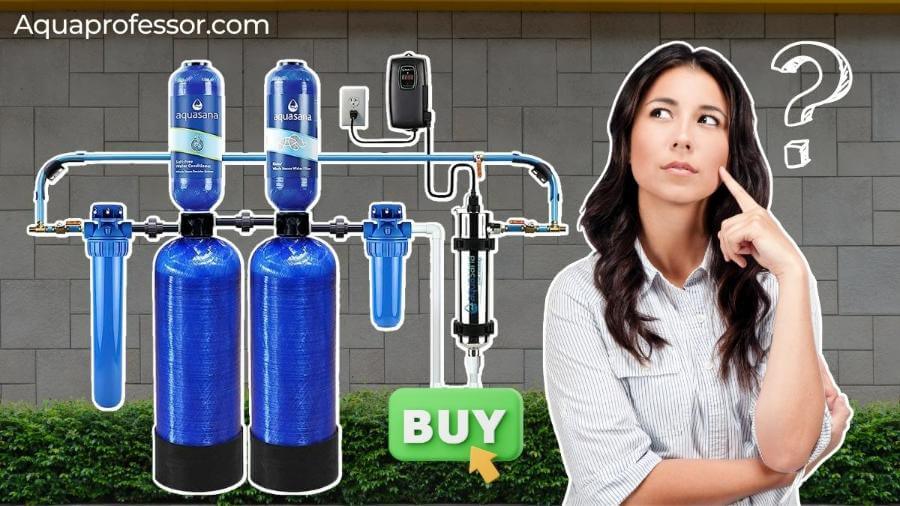
After considering various factors that helped us shortlist the top 3 water softeners, here’s a buying guide that your must follow while choosing the right softener for your septic system:
♻️Regeneration Type
As too much salt and discharge is bad for a septic system, opting for a demand-initiated water softener is advisable.
These systems regenerate based on actual soft water demands, conserving water and salt compared to timer-based water softeners.
🚰Softener Capacity
The softener capacity refers to the hardness a system can effectively remove before requiring regeneration.
Consider factors such as average water hardness levels, water usage patterns, and the number of people in your home to choose a water softener system with sufficient capacity to meet your household’s needs.
An optimum capacity softener will require regeneration less frequently and provide a continuous supply of soft water.
⚙️Ease Of Installation And Maintenance
Look for water softeners that offer easy installation and maintenance.
For installation, consider factors like space requirements, plumbing compatibility, user-friendly interface, DIY kits, and need for professional assistance.
As for maintenance, consider ease of cleaning and replacements to save time, effort, and money in the long run.
Also Read: Do You Need A Soft Water Loop?
🥡Number Of Brine Tanks
Water softeners are available in single or dual-brine tank configurations.
Out of two, Dual-tank water softeners are recommended for septic systems as they alternate during the regeneration process, ensuring a continuous and uninterrupted supply of soft water throughout the day.
On the other hand, a single tank system needs to shut down while the scheduled regeneration is in process.
💰Budget And Customer Reviews
Consider your budget when choosing a water softener system for your septic system.
Evaluate the initial cost, installation cost, and long-term maintenance expenses regarding water bills and salt usage.
Read customer reviews and check ratings to gain insights into different water softener models’ performance, reliability, and user satisfaction.
Feedback from existing customers can provide valuable information to help you make an informed decision.
You can also check for certifications from official third-party organizations such as WQA (Water Quality Association) and NSF (National Sanitation Foundation) under specific standards to know the softener’s efficacy.
Also Read: How Do I Know What Grain Water Softener I Need?
🎯How Does A Salt Water Softener Affect A Septic System?
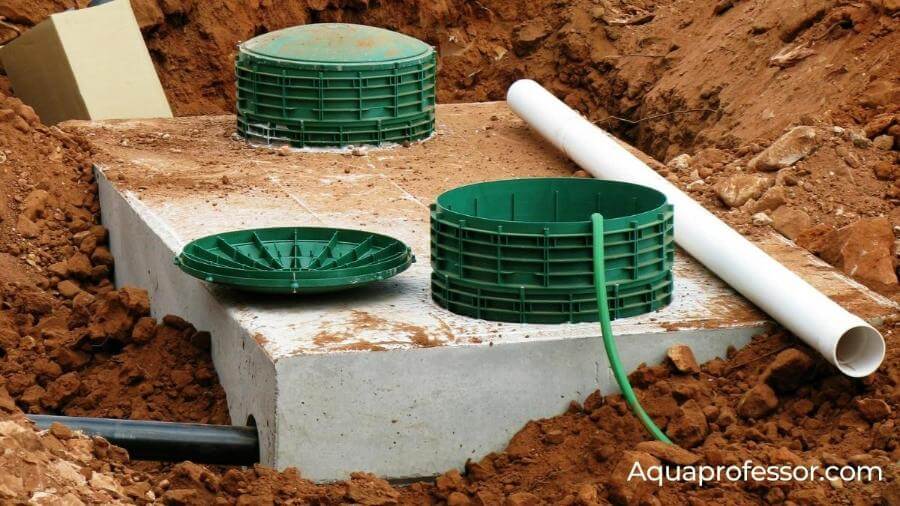
The impact of saltwater softeners on a septic system has been debated and researched. Earlier studies have suggested that salt softeners do not adversely affect septic systems and may even help optimize the performance of aerobic bacteria that digest organic waste inside the tank.
However, more recent studies have shown that the briny backwash from salt water softeners can have negative consequences.
This backwash can harm the beneficial bacteria in the septic system, which are crucial for the efficient breakdown of waste. The brine water backwash can clog your pipes and corrode the septic tank systems.
To provide a detailed understanding of how salt water softeners affect your septic system, let’s look into the positives and negatives:
👍Positives:
👎Negatives:
📌Note:
While the negative impacts of saltwater softeners on septic systems have been observed during recent studies, using water softeners is still necessary to prevent the negative effects of hard water on plumbing and appliances. The key is efficiently using water softeners with septic systems to minimize potential harm.
✅How To Safely Use Water Softener With Septic System?
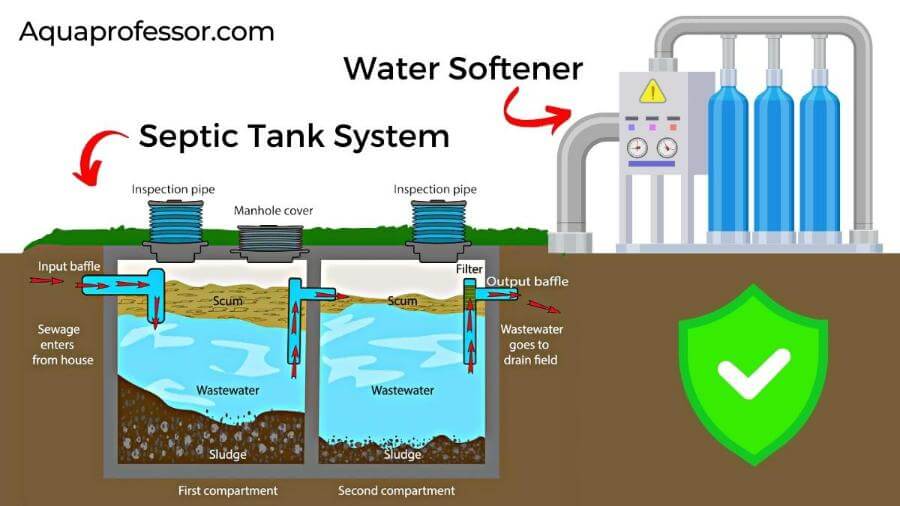
Remember to look into the local regulations and guidelines regarding using water softeners with septic systems for your locality to ensure compliance and proper functioning.
By following the above tips, you can ensure the safe and efficient use of water softeners with septic systems, minimizing the impact on the system and the environment.
💡Water Softeners And Aerobic Septic Systems: FAQs
What’s the best water softener salt for septic systems?
Potassium salt is often recommended when considering the best water softener salt for septic systems. The potassium salt helps reduce the salinity levels in septic systems, minimizing the impact on the balance of the septic tank environment.
However, you can also use a combination of sodium and potassium salt to soften and maintain lower saline levels effectively. It is also advised to consult the manufacturer’s guidelines and check local regulations before choosing the appropriate salt for your specific septic system needs.
Is using a water softener with a septic system bad?
Water softeners can potentially harm septic systems if not used correctly. The briny backwash from the water softener can harm helpful naturally occurring bacteria in the septic tank.
So, it’s best to take precautions like:
1. Using demand-initiated regeneration softeners
2. Opt for potassium salt or potassium and NaCl salt combination.
3. Limit softening usage whenever possible (plants don’t need soft water)
Where to discharge water softener backwash?
Discharging your water softener’s backwash outside the septic system is advised, preferably to a separate drain field suitable for salt and mineral discharge.
You can direct the discharged solution to appropriate areas, such as a dry well, an infiltration trench, or a vegetated area. These locations allow the backwash water to be absorbed into the ground or undergo natural filtration before reaching groundwater or surface water bodies.
What can I put in my septic tank to dissolve solids?
Although relying on natural bacterial decomposition in the septic tank to dissolve solids is best, you can also use additives to assist and speed up the process. Here are some additives that can help dissolve solids in your septic tank:
1. Active Yeast: Flush ¼ – ½ cup active yeast down your toilet and let it settle down in your pipes for some time.
2. Rotten Tomatoes: Run down cut pieces of 3-4 rotten tomatoes down your garbage disposal a few times a year. Tomatoes contain a natural enzyme – Pectinase, that helps break down plant cell walls containing pectin in your solid waste.
3. Chemicals: Diluted Hydrogen peroxide and Inorganic acids can break down solid waste and resolve clogging issues. However, be careful to dilute them properly, as they can damage pipelines, kill bacteria, and harm the soil in their concentrated form.
4. Pumping: Get your septic tank pumped by a professional once every few years to remove accumulated waste, bad odor and maintain a healthy system.
What is a septic system?
A septic system is an on-site wastewater treatment unit commonly used in residential colonies not connected to the centralized municipal sewer system. It comprises a septic tank and a drain field, where bacteria break down organic waste. It operates on principles of anaerobic digestion and soil filtration.
Adarsh is a Health & Nutrition Sciences graduate with expertise in environmental health. He is associated with ventures like Glacier Fresh Filter and Simpure Filter Systems. Through Aqua Professor, he intends to provide helpful information to every home to help them make smarter decisions.

